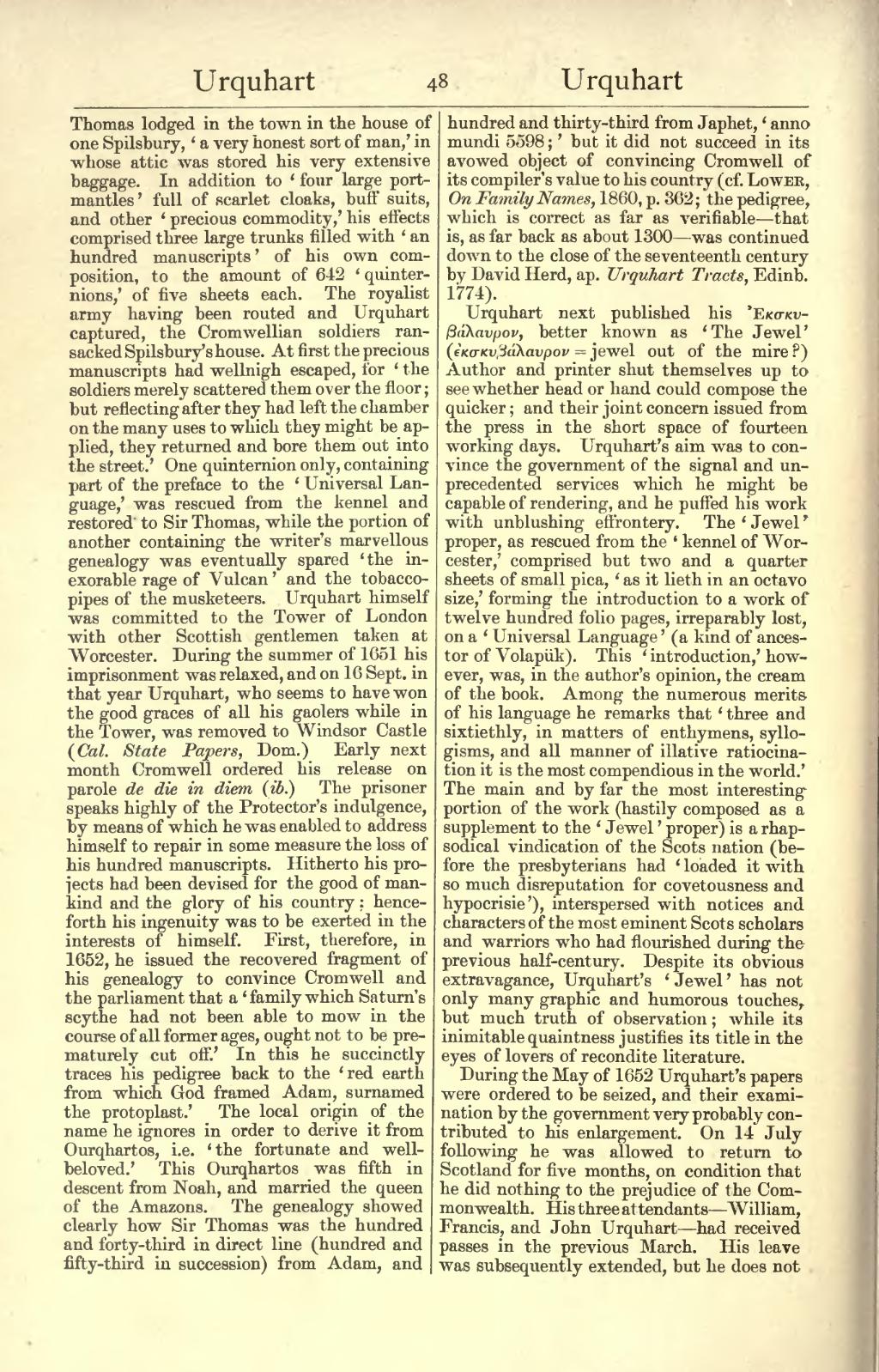Thomas lodged in the town in the house of one Spilsbury, ‘a very honest sort of man,’ in whose attic was stored his very extensive baggage. In addition to ‘four large portmantles’ full of scarlet cloaks, buff suits, and other ‘precious commodity,’ his effects comprised three large trunks filled with ‘an hundred manuscripts’ of his own composition, to the amount of 642 ‘quinternions,’ of five sheets each. The royalist army having been routed and Urquhart captured, the Cromwellian soldiers ransacked Spilsbury's house. At first the precious manuscripts had wellnigh escaped, for ‘the soldiers merely scattered them over the floor; but reflecting after they had left the chamber on the many uses to which they might be applied, they returned and bore them out into the street.’ One quinternion only, containing part of the preface to the ‘Universal Language,’ was rescued from the kennel and restored to Sir Thomas, while the portion of another containing the writer's marvellous genealogy was eventually spared ‘the inexorable rage of Vulcan’ and the tobacco-pipes of the musketeers. Urquhart himself was committed to the Tower of London with other Scottish gentlemen taken at Worcester, on 3 Sept. 1651. His imprisonment was almost immediately relaxed, and on 16 Sept. following Urquhart, who seems to have won the good graces of all his gaolers while in the Tower, was removed to Windsor Castle (Cal. State Papers, Dom.). Early next month Cromwell ordered his release on parole de die in diem (ib.) The prisoner speaks highly of the Protector's indulgence, by means of which he was enabled to address himself to repair in some measure the loss of his hundred manuscripts. Hitherto his projects had been devised for the good of mankind and the glory of his country; henceforth his ingenuity was to be exerted in the interests of himself. First, therefore, in 1652, he issued the recovered fragment of his genealogy to convince Cromwell and the parliament that a ‘family which Saturn's scythe had not been able to mow in the course of all former ages, ought not to be prematurely cut off.’ In this he succinctly traces his pedigree back to the ‘red earth from which God framed Adam, surnamed the protoplast.’ The local origin of the name he ignores in order to derive it from Ourqhartos, i.e. ‘the fortunate and well-beloved.’ This Ourqhartos was fifth in descent from Noah, and married the queen of the Amazons. The genealogy showed clearly how Sir Thomas was the hundred and forty-third in direct line (hundred and fifty-third in succession) from Adam, and hundred and thirty-third from Japhet, ‘anno mundi 5598;’ but it did not succeed in its avowed object of convincing Cromwell of its compiler's value to his country (cf. Lower, On Family Names, 1860, p. 362; the pedigree, which is correct as far as verifiable—that is, as far back as about 1300—was continued down to the close of the seventeenth century by David Herd, ap. Urquhart Tracts, Edinb. 1774).
Urquhart next published his Ἐκσκυβάλαυρον, better known as ‘The Jewel’ (ἐκσκυβάλαυρον = jewel out of the mire?). Author and printer shut themselves up to see whether head or hand could compose the quicker; and their joint concern issued from the press in the short space of fourteen working days. Urquhart's aim was to convince the government of the signal and unprecedented services which he might be capable of rendering, and he puffed his work with unblushing effrontery. The ‘Jewel’ proper, as rescued from the ‘kennel of Worcester,’ comprised but two and a quarter sheets of small pica, ‘as it lieth in an octavo size,’ forming the introduction to a work of twelve hundred folio pages, irreparably lost, on a ‘Universal Language’ (a kind of ancestor of Volapük). This ‘introduction,’ however, was, in the author's opinion, the cream of the book. Among the numerous merits of his language he remarks that ‘three and sixtiethly, in matters of enthymens, syllogisms, and all manner of illative ratiocination it is the most compendious in the world.’ The main and by far the most interesting portion of the work (hastily composed as a supplement to the ‘Jewel’ proper) is a rhapsodical vindication of the Scots nation (before the presbyterians had ‘loaded it with so much disreputation for covetousness and hypocrisie’), interspersed with notices and characters of the most eminent Scots scholars and warriors who had flourished during the previous half-century. Despite its obvious extravagance, Urquhart's ‘Jewel’ has not only many graphic and humorous touches, but much truth of observation; while its inimitable quaintness justifies its title in the eyes of lovers of recondite literature.
During the May of 1652 Urquhart's papers were ordered to be seized, and their examination by the government very probably contributed to his enlargement. On 14 July following he was allowed to return to Scotland for five months, on condition that he did nothing to the prejudice of the Commonwealth. His three attendants—William, Francis, and John Urquhart—had received passes in the previous March. His leave was subsequently extended, but he does not
